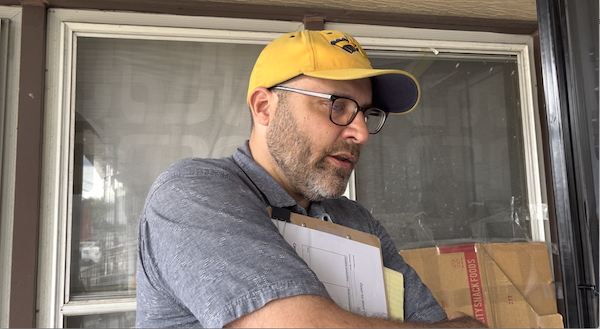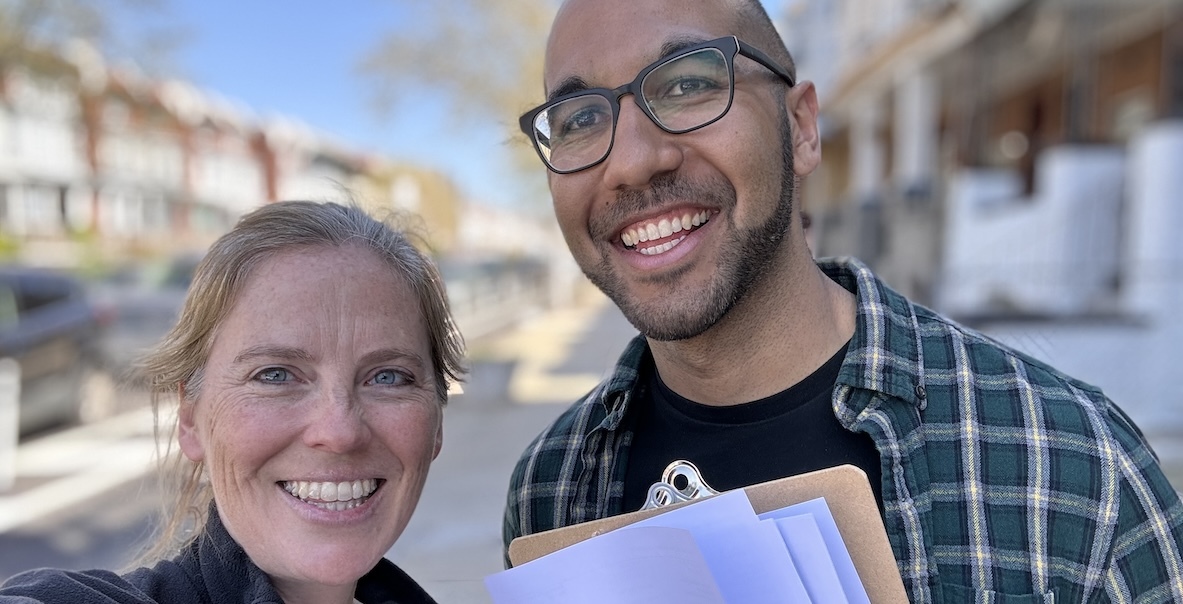When Adam Barbanel-Fried first met Hafeez on Hafeez’s aunt’s Cobbs Creek porch last Sunday, the young man — a 17-year-old who will be 18 in July — was decidedly on the fence about voting in this year’s presidential election.
On a scale of 0 to 10 (with 10 being a definite voter), Hafeez told Barbanel-Fried, he was right in the middle, at a 5 — because while he wanted his voice to be heard, he was “not into being political.” He was, in other words, what those who care about American democracy are most worried about in 2024: That citizens who could be — should be — voting, will stay home.
If that happens, what we get by default could be no less than catastrophic for the American experiment that started here in Philadelphia. Autocracy and the preservation of the rule of law are on the ballot as never before.
“People often take the lack of interest of some voters as based in apathy, or even antipathy towards the world. But maybe, sometimes, all that’s needed is a mix of persistent, patient, and kind outreach.” — Adam Barbanel-Fried
We must, as MSNBC anchor/Citizen board member Ali Velshi — a fierce advocate for citizenship on the scale of each individual American — has said, “do what’s available” to stop that from happening. Voting — for anyone, in every single election — is our only hope for preserving our rights, including our right to vote. That has always been a guiding principle for The Citizen. And this year, more than ever, we need an army of citizens to not just cast their own ballots — but to also convince everyone to do the same.
That’s what led me to Barbanel-Fried, the executive director of get out the vote organization Changing the Conversation Together (CTC), and to his painstaking work in getting unlikely voters to the polls on November 5. The Citizen is partnering with CTC — along with WURD, Community College of Philadelphia, Broad Street Love, Young Involved Philadelphia, PhillyBOLT and Committee of Seventy — to train volunteers to be deep canvassers ahead of the important 2024 presidential election. (Sign up here for our June 10 training at Broad Street Love.)
What happened over the next 15 minutes after Barbanel-Fried met Hafeez was an intense and thoughtful approach to our participatory democracy. First Barbanel-Fried launched into a longish story about a surprise birthday package his now-wife sent him when they were just friends finishing their freshman year in college — the most spontaneous act of love he’d ever experienced.

Then Barbanel-Fried asked Hafeez to share his own story and listened intently as Hafeez — by now joined on the porch by his 14-year-old brother — talked about growing up in South Philly projects with a father, uncles and brothers in prison; his own time spent in jail; his baby; and the long and unwavering love of his hardworking mother, who has always encouraged him to keep going.
“It seems like you and I both know what it means to love someone and have them love you; we both know what it means to rely on people and have them rely on you,” Barbanel-Fried replied. “To me, voting is about choosing the people who lead with that kind of love — and not with hate and violence. What do you think?”
Hafeez thought for a moment, then conceded the point. When prompted again, he told Barbanel-Fried that his intentions had changed: He was now a 10 on the voting scale, a definite voter. He now understood, he explained, the link between those he loves and those we choose to lead us.
“Here’s a young Black teenage boy, about to turn man, living in the most important city in one of the most important states in the presidential election,” Barbanel-Fried said later. “People often take the lack of interest of some voters as based in apathy, or even antipathy towards the world. But maybe, sometimes, all that’s needed is a mix of persistent, patient and kind outreach.”
Doing what works
I witnessed Barbanel-Fried’s exchange with Hafeez as part of an all-volunteer “deep canvassing” effort in a neighborhood of West Philadelphia that CTC is targeting for its get out the vote efforts in 2024. The 60 volunteers knocked on doors of people who are “infrequent” voters — those who are on the voter rolls but are at risk of not voting — using a script created by CTC that starts with a reminder about the election, veers into a personal story exchange, and then wraps up with a nudge to action (voting).
The goal of deep canvassing here is not so much to convince voters about whom to vote for. It’s to combat the real risk to democracy in the upcoming election: Those who choose to not vote. CTC this year is working primarily in Wards 3, 46 and 60, which are 97 percent Black, with an average income around $30,000. Traditionally, turnout in these areas — which lies within State Rep. Joanna McClinton’s district — has been about 20 percent lower than the rest of the city in presidential elections.
CTC is working to change that, as they did in 2022 in several neighborhoods of North and West Philadelphia. During that year’s contested senatorial and gubernatorial elections, 175 volunteers knocked on 12,800 doors, and had more than 1,000 complete deep canvassing conversations. Citizens who took part in those conversations voted at a 15 point increase over their neighbors who did not talk to CTC canvassers.
That was despite overall turnout in Philadelphia dropping by 12 percent from the last midterm election in 2018, and Philadelphia’s share of the Pennsylvania turnout dropping by about one-third, the worst of any county in the state.
Considering how close the elections were in both 2016 and 2020, even a small bump in either direction can make the difference in who wins the presidential race in Pennsylvania — and maybe even the country. That’s what prompted volunteers from Philly, New York and as far away as Los Angeles to spend a beautiful spring Sunday deep canvassing in Philadelphia’s 3rd Ward.
Sunday happened to be the same day The New York Times ran a story about the dip in support for Biden from Black Philadelphians. The story also looked at the state more generally:
In Pennsylvania, Mr. Biden is doing slightly worse with Black voters than four years ago, though he still wins the vast majority, according to a New York Times/Philadelphia Inquirer/Siena College survey released this past week. He was the choice of 69 percent of Black voters now, compared with 79 percent in June 2020. Mr. Trump was ahead in the state overall in the most recent poll.
For Democrats on the ground, the work to mobilize Black voters — colloquially described as a “battle against the couch” — is steep.
“I love thinking about the people I love when I vote.”
A longtime community and union organizer, Barbanel-Fried co-founded CTC in 2017. He led a team of deep canvassers to help elect a Democratic state representative in a Trump-leaning district in Staten Island. He based his work on that led by David Fleischer, a lawyer and community organizer at the Leadership LAB in Los Angeles, which pioneered deep canvassing during the run-up to the second California vote on gay marriage.
Both Fleischer’s efforts to sway voters to favor gay marriage, and Barbanel-Fried’s efforts in Staten Island proved successful. Fleischer, whom Barbanel-Fried considers a mentor, came with LAB to work with CTC in Philadelphia in 2020, and was here again on Sunday.
CTC now has both a nonprofit 501c3 arm, and a 501c4 political action committee, CTC for Progress. The Citizen is partnering with the nonprofit to do a series of trainings for those interested in deep canvassing.
Deep canvassing is just one of the efforts The Citizen will undertake in the run-up to the 2024 election, which also includes state races for Attorney General and others. Stay tuned for details about an Ultimate Job Interview for AG candidates in the fall, updated voter guides, opportunities to get out the vote, and other ways to get involved.
“To me, voting is about choosing the people who lead with that kind of love — and not with hate and violence. What do you think?” — Adam Barbanel-Fried
At the event on June 10, Barbanel-Fried and his Philly team will help participants craft their own stories of love to take out into the field, and demonstrate what a deep canvassing conversation looks like. As when we partnered with CTC in 2022, those interested in using the experience to work with the group in West Philly can sign up for the next monthly canvas on June 23.
But the training also provides valuable lessons for the kinds of conversations even the non-canvassers among us will face between now and November. This is a moment when no one can afford to sit on the sidelines; it will take all of us to get our neighbors, family members, friends and coworkers to cast a ballot. It’s also a moment when talking about electoral politics is more fraught than ever. Deep canvassing’s combination of emotional storytelling and active listening is the perfect antidote to that.
On our walk up and down Hafeez’s block, Barbanel-Fried and I met a couple of self-declared “super voters,” including an older woman whose father fled with his family to Philadelphia from Georgia in 1968 to avoid arrest for agitating for Black voting. We met a young Black police officer, on his way to work, who stood ramrod straight and listened to Barbanel-Fried’s story before making clear that he plans to vote for Trump. We approached an older man getting into his car, then watched him stop in front of a neighbor’s house, roll down the window and start up his own conversation about voting.
It was both gratifying and hopeful. It was, also, exhausting, as connecting with our fellow humans can be when we try to do so with empathy and generosity and no judgment. There is no shortcut to relationship-building, just as there is no shortcut to democracy.
After Sunday’s canvas, volunteers gathered in the church again to debrief. They talked about what was hard, like eliciting specific stories from people, and what felt like progress: One volunteer interacted with a man who had rarely voted before CTC reached him in 2020 — and has cast a ballot in every election since, even low turnout local ones.
Another talked to a voter who remembered CTC from 2022. “You guys are the ones who get personal about voting,” she said, according to the canvasser. “I love this. I’ve been voting, and now I love thinking about the people I love when I vote.”
Sign up for The Citizen’s free deep canvassing training on Wednesday, June 10, from 5:30 to 7:30pm at Broad Street Love, 315 S. Broad Street.
![]()
MORE ON DEEP CANVASSING
Deep canvassers Kate Bicknell (left) and Evan Traylor in West Philadelphia.


